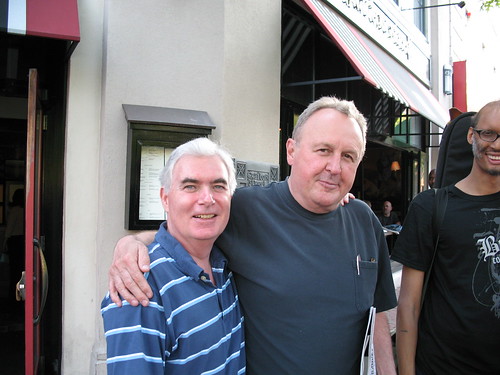Ed Barrett, left, with Bill Corbett
I had the strangest experience with Ed Barrett’s “prose poem novel” (as it says on the rear jacket) Kevin White. I read the first half of it over two days, then got interrupted by what daily life was throwing at me, then couldn’t remember which backpack I’d put the book in so took a few more days before I picked it back up and finished it. But the experience was of two almost completely different books. During my first stint, I was definitely reading, feeling, seeing the prose poem on every page, even if it was a remarkably cohesive set of same. Here is the very first poem, from the book’s first (of nine) sets, “Kevin and John”:
I saw Kevin White’s mind disappearing into heaven as he bent down to pick up a tea bag John Wieners left on I-93 Southbound to remind oncoming traffic and the Big Dig that we have been set to – Boston, a mound of curly tight shiny law in the mind of Kevin our charge – and holding it like a ribbon to give a pretty girl, he placed it on his tongue and spoke to the Virgin Mary his language of tannin.
A single sentence prose poem that incorporates the former mayor of Boston, its most iconic poet, its most infamous “improvement” project, the Boston tea party, the Catholic church – dichtung don’t get much more condensare than that as Pound might have put it.
But when I returned to it, Kevin White had indeed turned into a novel, as elegant as anything plotted out by David Markson, each page as realized, both symbolically & visually, as Don DeLillo at his best. I went back & started over attempting to see it as I had at first, as a “collection” of separate poems around a series of recurring motifs, but I just couldn’t. Somehow the book had actually transformed itself. It was (is) a very spooky bit of magic.
For a guy born in
Barrett has, in fact, been in
In fact, he’s not really like either, or at least this book isn’t. At first I thought of Kevin White as being closer in its sensibility to the sort of booklength poem that takes advantage, say, of genre vocabulary & devices, rather the way James Sherry’s 1981 In Case deployed the language of the hardboiled detective novel. But really it’s the city, not a genre, that’s the organizing principle here:
Flight Into
I saw former Red Sox pitcher Bill "The Spaceman" Lee take something from a dumpster in front of the Corbett house. "Watch it!" said Lee, "dreams are not hard science like colonoscopy and laser hair removal-dreams don't even know your name, Mr. Wally Cox, and therefore they come to you but could just as easily visit someone else when all you wanted was to have your head patted like a child. And I am Bill Lee, making a voodoo doll of Carl Yazstremski whose dream came to me by mistake and said Yaz was living in the Corbett house, upstairs under the eaves." "Is Bill moving?" I asked, "What's he need a dumpster for, anyway?" "Ask him yourself, here he comes," shouted Bill Lee as he ran down
This is the lone poem in the final section of the book (&, in fact, is the final work Barrett read at Writers House as well, a good piece on which to close). The return here of John Wieners makes me realize that the deeper model in Kevin White, deeper than the novel, just might be the serial poetry of Jack Spicer, especially the run of great books that began with Heads of the Town Up to the Aether & ran through Book of Magazine Verse. That’s the kind of cohesion I sense page-to-page, section-to-section, tho with none of the acrid sarcasm that characterizes so much of Spicer’s use of public figures.
Oddly, as I write, Small Press Distribution has no copies of Kevin White on hand & the Pressed Wafer website hasn’t been updated even longer than that of the National Poetry Foundation, so it may well be that you can’t buy this book at the moment. Which is a shame. Hopefully this will be corrected shortly.
¹ Tho I note her body was buried where Bulger had already stocked two other bodies, one of them a drug trafficker & jewel thief by the name of Arthur “Bucky” Barrett.






